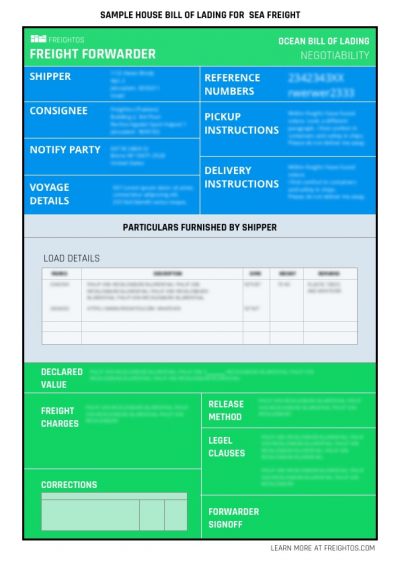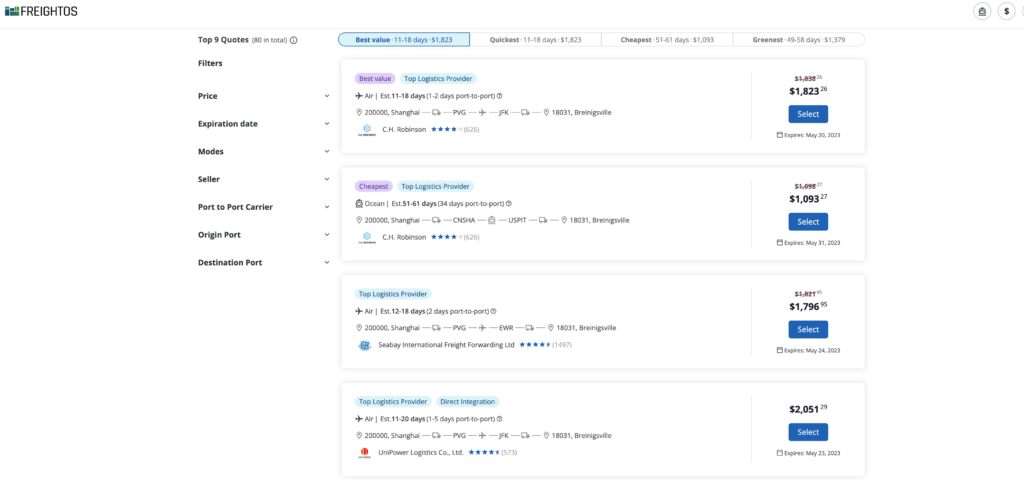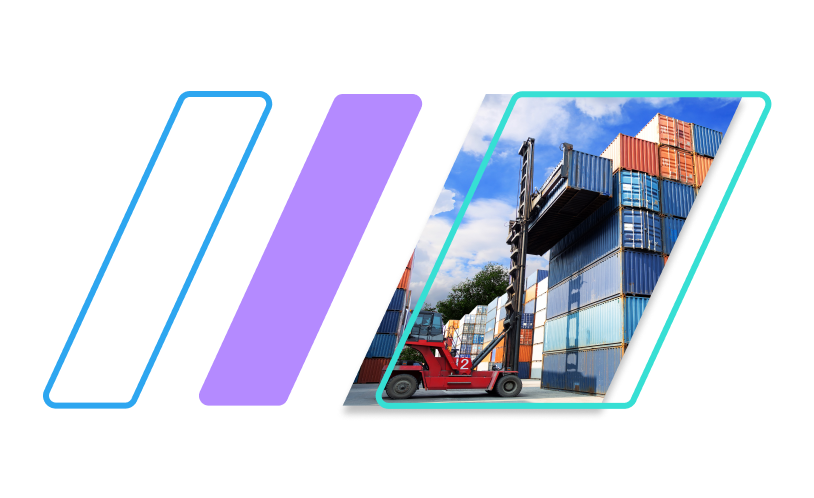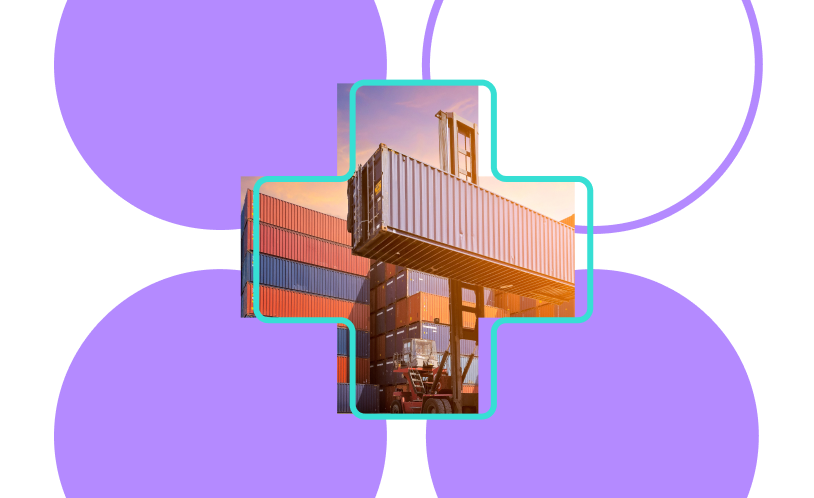
The freight market is a trillion-dollar industry that relies on successful transactions between buyers and sellers. For newcomers entering this complex ecosystem, the amount of information and intricacies involved c an be overwhelming. That’s why we’ve compiled the top 10 questions asked by new shippers. Read on to get crucial info to streamline your shipping process.
Completely new to shipping? Check out our freight knowledge base covering shipping basics to learn more about the fundamentals of shipping, terminology, and documentation.
1. What is the BOL/Arrival Notice and who provides it?
The BOL (Bill of Lading) is one of the most important freight documents. It helps with tracking, payment, insurance claims, and liability. The BOL is a loading receipt, contract of carriage, and document of title all rolled into one.
The BOL is provided by the carrier when the cargo is loaded as proof that the goods are handed over. It also serves as a receipt that the shipment was received in good condition (unless a note to the contrary is made on the BOL at pickup).
The Arrival Notice (AN) is also provided by the carrier when the shipment is about to arrive at the destination port.
Find out more about the BOL/Arrival Notice here.

2. What is transit time and how is it calculated? Does container size affect transit time?
Transit time refers to how long it takes for a shipment to be delivered to its final destination after being picked up from a designated pickup point. The amount of time needed to move goods from one point to another varies widely, so it’s important to get this information before booking a shipment.
Transit time can vary due to several factors, including carrier schedules, potential delays in customs clearance, and unforeseen events such as weather conditions and global incidents.
It is calculated by taking into account the origin and destination of goods, the mode of transportation chosen, the distance to be traveled, and any applicable customs procedures.
Container size can affect transit time, but will not have a significant impact on the duration of the shipment.
3. What documents are needed for international shipping?
International shipping is a minefield of freight documents. However, unless you have specialized cargo, you only need to worry about nine key documents. They are:
- Shipping Quote
- Commercial Invoice
- Certificate Of Origin
- Material Safety Data Sheet
- Shipper’s Letter Of Instruction
- Booking Confirmation
- Bill Of Lading/Air Waybill
- Packing List
- Letter Of Credit
Watch the video below to learn about the necessary paperwork and documents needed for import customs clearance in the United States.
4. Are duties and taxes included and how are they calculated?
Quotes on Freightos.com do not include customs duties, taxes, or other government fees, and are the responsibility of the shipper.
Calculating customs duties can get complicated, especially when importing several products. When you are first considering importing a product, check out the likely classification with our HS code lookup tool and get an estimate of customs duties with our import duty calculator.
5. Can the forwarder be the Importer of Record (IOR)?
Unless the supplier is making the import declaration, the shipper acts as the Importer of Record (IOR). As the IOR, it’s your responsibility to provide the correct information Customs needs. For more information on IOR, click here.
6. How do I connect the freight forwarder with my supplier?
After booking a shipment the shipper will be required to include the supplier’s contact details among other requirements. Once the shipment is released, the forwarder will contact the supplier to check on the goods ready date and arrange the pickup/drop off.

Looking for live quotes from vetted providers?
7. Who will pickup the shipment?
The pickup is handled by the forwarder who arranges agents with the correct equipment to execute the pickup. The forwarder sends out the suitable agents based on the shipment type if it’s regular or Amazon, and also depending on the shipment details. Click here to review the full shipment process from pickup to delivery.
8. Is the quote accurate?
When you request a quote on Freightos.com, you can expect it to be accurate and binding throughout its validity period. The price you see will not change as long as the information about your shipment remains the same.

Changes to the pickup time or the actual weight and dimensions of the shipment could affect the accuracy of the quote. The quote does not include customs duties or other governmental fees that the logistics provider is not responsible for. For more information, refer to the Freightos.com Standing Operating Procedure.
9. How can I file an insurance claim? What does insurance include?
To submit an insurance claim, you have to either be the legal owner (with a title) of the damaged freight, an entity accepting the risk of loss in transit, or a legal proxy. The claim has to be made to the carrier of origin or delivery and should be sent to the claims manager at the carrier’s headquarters. For the most part, the forwarder should be able to support you with this.
You can check the insurance policy through the insurance certificate uploaded to your shipment page. Making a claim is as easy as going to the carrier’s site as soon as you know about the damage/loss.
For more information on Cargo insurance, click here.
Freight can be complicated and mistakes can happen – but we’re here to help you avoid the most common ones- such as not playing it safe with insurance:
10. What can’t I ship?
At Freightos.com, our logistics providers can handle almost any shipment. However, there’s certain types of cargo that our providers can’t support or insure because of the risk of damage to vessels, containers, or pilferage.
These include personal effects, hazardous materials (HAZMAT), goods in bulk vessels, fragile cargo (windows, glass, models such as cars or airplanes), jewelry, antiques, artwork, temperature-controlled goods, fresh produce, and perishable goods, among many more. For a full list of problematic or rejected shipments, click here.
Click here to learn more about Freight Restrictions, or here for the types of freight that are prohibited by the International Forwarding Association.
Didn’t find what you were looking for?
Find answers instantly on the Freightos resource page which is continuously updated to address the most common and complex questions from shippers. It covers a wide range of topics, including troubleshooting technical issues and gaining a deeper understanding of our products and services.
Have questions regarding the industry? Check out our freight knowledge base for all the guides and tools you need to help you plan your next shipment with confidence.
Alternatively, you can reach out to our dedicated customer support team for personalized assistance.




